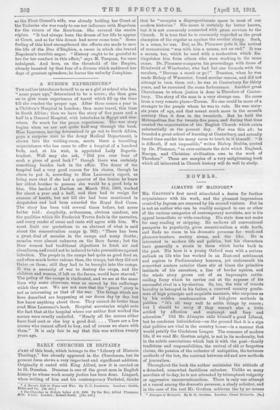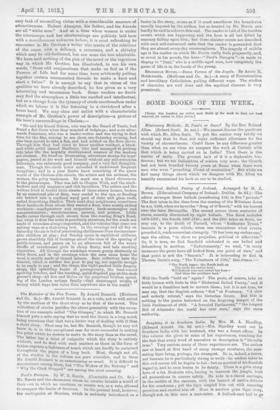NOVELS.
ALMAYNE OF MAINFORT,*
Mn. GnETToN's first novel stimulated a desire for further acquaintance with his work, and the pleasant impressions created by Ingram are renewed by his second venture. But he is not an author who can be readily assigned to one or other of the various categories of contemporary novelists, nor is his appeal immediate or wide-reaching. His style does not make for easy reading or skipping. He eschews all conventional passports to popularity, gives sensationalism a wide berth, and finds no room in his dramatis personae for week-end pleasure-hunters, society sirens, and the like. He is interested in modern life and politics, but his characters have generally a strain in them which harks back to the past. His hero is a young Oxford man with a serious outlook on life who has worked in an East-end settlement and aspires to Parliamentary honours, yet underneath his somewhat austere exterior there stir at times the primitive instincts of his ancestors, a line of border squires, and the whole story grows out of an impromptu cattle- raiding foray which be carries out at the expense of his successful rival in a by-election. So, too, the vein of remote heredity is betrayed in his father, a reserved country gentle.. man of high principle and exquisite manners, who surprises us by his sudden condemnation of kid-glove methods in politics. "It's all very well to settle things by reason; but I should bo sorry if they weren't also a little settled by affection and contempt and fury and adoration." Old Mr. Almayne calls himself a good Liberal, but he condones intimidation—on the ground that it is a sign that politics are vital in the country house—in a manner that would petrify the Gladstone League. The romance of modern life, if we read Mr. Gretton aright, is not in its modernity, but in the subtle associations which link it with the past—family traditions and responsibilities, the revival of old or forgotten claims, the passion of the collector of antiquities, the tortuous methods of the law, the contrast between old and new methods of journalism.
Throughout the book the author maintains the attitude of a detached, somewhat fastidious onlooker. Unlike so many novelists of to-day, he is not attracted by triumphant vulgarity or aggressive unconventionalism. There is only one attempt at a rascal among the dramatis personae, a shady solicitor, and in the ease of the rest Mr. Gretton achieves the by no means Aimayne of Mainfort. By H. Grottos, London: Grant }diehards. [U] easy task of reconciling virtue with a considerable measure of attractiveness. Hubert Almayne, his father, and his friends are all "white men." And at a time when woman is under the microscope, and her shortcomings are publicly laid bare with a mercilessness unknown before, it is most refreshing to encounter in Mr. Gretton a writes• who treats of the relations of the sexes with a delicacy, a reverence, and a chivalry which may be old-fashioned, but are none the leas admirable. We have said nothing of the plot of the novel or the ingenious way in which Mr. Gretton has illustrated, to use his own words, "those odd conjunctions that make us feel as if the Powers of Life had for sonic time been arbitrarily pulling together certain unconnected threads to make a knot and start a twine," It is enough to say that in virtue of the qualities we have already described, ho has given us a very interesting and uncommon book. Some readers no doubt
may find the atmosphere a little too rarefied and intellectual, but as a change from the tyranny of crude emotionalism under which we labour it is like listening to a clavichord after a brass band. We may close our notice with a characteristic example of Mr. Gretton's power of description—a picture of his hero's surroundings in Chelsea:—
"He and his friend Nelson, who was in the Board of Trade, had found a flat there when they wearied of lodgings ; and soon after- wards Freestone, who was a loader-writer and was trying to find time for the Bar, coming to see thorn one Saturday evening, had also been moved to take a flat, and had settled on the floor above. Through him they had come to know another resident, a black- and-white artist named Shelburn, who had managed to prolong into later life the brutally disillusioned manner of the modern art student. He lived' on illustrating adventure stories for boys' papers, jeered at his work and himself without any self-conscious bitterness, was extremely good company, and a very fair draughts- man. Though the circle never extended it underwent frequent irruptions ; and in a year Bertio knew something of the queer world of the Chelsea, sidiastreets, the artists and the artisans, the writers, the petty tradesmen. Its mark was a bland obtuseness to the picturesque. That was left to Cheyne Walk, and the stock- brokers and city magnates and rich barristers. The artists and the writers lived in horrid little streets of throe-gem houses, broken by an occasional pile of flats, very sordid to the eye, or flooding out behind into a confined wavy pool of slate and glass roofs, called Something Studios. Their next-door neighbours, sometimes their landlords from whom they rented a floor, were mostly skilled workman—eoachpainters and carpenters ; bank-messengers and commissionaires ; warehousemen, carmen, and porters. Little traffic comes through such streets from the roaring King's Road, hut when it does the noise is peculiarly atrocious, for the roads are made of macadam always imperfect, and the vehicles that come aro railway vans at a shattering trot. In the evenings and all day on Saturday the air is full of penetrating shrillnesses from the innumer- able children at play ; and Sunday opens in sepulchral stillness, grows stealthily full of footsteps about the time of the opening of public-houses, and passes on to an afternoon full of the weary shuffle of overdressed girls in cheap finery, and lads smoking cigarettes. All through the weekdays women gossip slatternly at their doors, and in the evenings when the men came home the meal is mostly made of tinned salmon. Rate collectors hate the district, which is neither too poor to pay up, nor capable enough to be ready to pay ; and the shops, the tight-packed little drapery shops, the sprawling banks of greengrocery, the loud-voiced sporting butcher, and the bustling, quick-fingered pay-at-the-desk grocer's shop—all live and thrive on the perpetual feckless spend- ing of the London artizan family—that unmanaged trickle of money which buys loss value than anywhere else in the world."
The Matador of the Five Towns. By Arnold Bennett. (Methuen and Co. Cs.)—Mr. Arnold Bennett is, as a rule, not so well suited by the medium of the short story as by that of the novel. This collection of stories justifies the above generality with the excep- tion of one example called "The Glimpse," to which Mr. Bennett himself puts a note say ing that he used the theme in a long novel, being conscious that that was a better way of dealing with it than a short story. That may be, but Mr. Bennett, though he may not know it, is in this exceptional case far more successful in making the point which ho desires to make in the story than in the novel. Tho latter has a taint of vulgarity which the story is entirely without, and to deal with such matters as these in the form of fiction requires a lightness of touch which can hardly be sustained throughout the pages of a long book. Most, though not all, of the studies in the volume are pure comedies, and in them Mr. Arnold Bennett is as entertaining as usual. It is difficult to discriminate among them, but "The Widow of the Balcony" and " Why the Clock Stopped" are among the most amusing.
Paul's Paragon. By W. E. Norris. (Constable and Co. 6s.)— Mr. Norris and the characters whom he creates inhabit a world of their own in which no emotions or events are, as a rule, allowed to overpass the limits of decorum. In the present book, however, the earthquake at Messina, which is suddenly introduced as a factor in the story, seems as if it must overthrow the boundaries usually imposed by the author, but as treated by Mr. Norris mu- hardly be said to achieve this end. The reader is told of the terrible events which are happening, and the hero is all but killed by masonry falling upon him ; but these sinister events are described with such self-restrained cairn that the reader is persuaded that they are almost every-day commonplaces. The tragedy of middle age is the matter on which Mr. Norris really fools poignantly, and, as usual in his novels, the hero—" Paul's Paragon "—is made to display to " Paul," who is a middle-aged man, bow completely the game of life is in the hands of the young.
RIIIADABLZ Nevins—Dame Verona of the Angels. By Annie E, Holdsworth. (Methuen and Co. Os.)—A story of Protestantism and hereditary Catholicism pulling different ways. The studies of character are well done and the mystical element is very prominent.







































 Previous page
Previous page